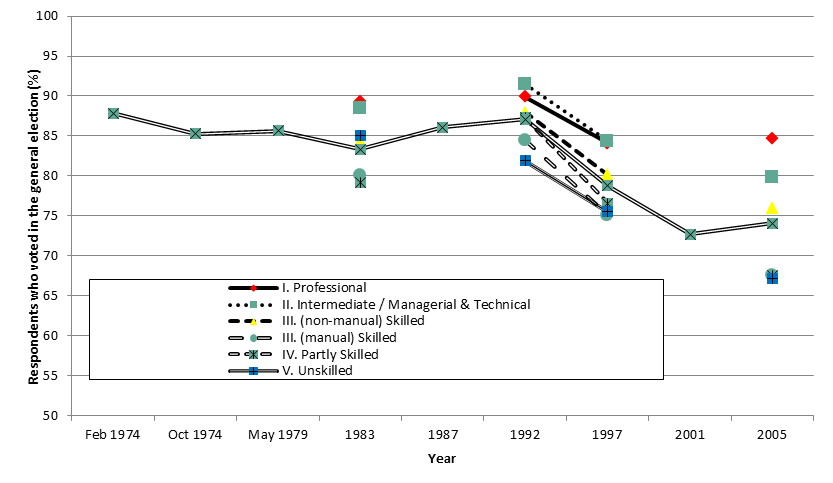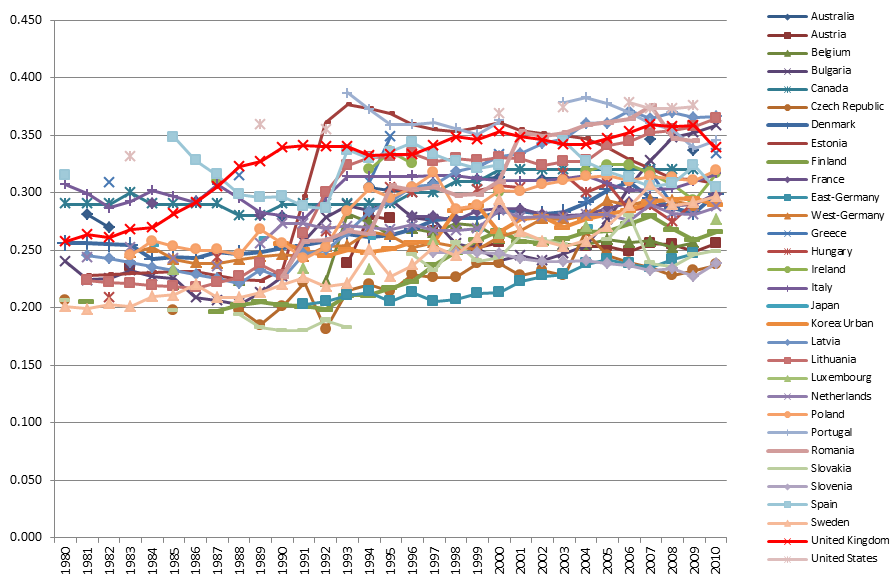 Increasing inequalities across some of the richest countries in the world are not inevitable according to findings from an international research project. Indeed, governments play a key role in determining domestic levels of inequality, writes Abigail McKnight, one of a team of 200 researchers who contributed to this research.
Increasing inequalities across some of the richest countries in the world are not inevitable according to findings from an international research project. Indeed, governments play a key role in determining domestic levels of inequality, writes Abigail McKnight, one of a team of 200 researchers who contributed to this research.
Researchers across 30 countries (All 27 EU countries except Malta and Cyprus; Australia, Canada, Japan and the US) spent three and a half years collaborating on a project entitled Growing Inequalities’ Impacts – The GINI Project. The project examined trends in economic inequalities, evidence of social, political and cultural impacts and an assessment of policy effectiveness in terms of limiting the growth in inequality and any potentially negative impacts. The research evidence from these countries shows increases in income inequality over the last 30 years, which appear to have been driven initially by increasing earnings inequality and latterly by a fall in the effectiveness of welfare states through changes in tax policies and cash transfers.
The general increase in inequality was not uniform across countries with considerable variation in the timing of increases and their scale. In fact inequality did not increase in all countries and there were periods in many countries where inequality was stable or even fell. Figure 1 shows this messy picture.
Figure 1: Income inequality trends (Gini coefficient)
Source: GINI Database – equivalised household disposable income
The research concludes that increasing inequalities are not inevitable and governments play a key role in determining domestic levels of inequality even in a set of highly globalised rich countries. Why does inequality matter and why should governments be interested in seeking to contain inequality increases? Put very simply: people don’t like inequality. Attitudinal data reveals that people across these countries expressed a dislike for inequality in their societies and this dislike for inequality increases when inequality rises. A sizeable proportion believes that their governments should do more to redistribute income or increase spending on programmes to enhance opportunity.
The research also found that increases in inequalities have been accompanied by falling political participation with fewer people voting in political elections or actively engaging in politics, with much greater falls occurring among the least advantaged members of societies than the more privileged.
Concern has been growing about increases in concentration of income and wealth among a small group of people and the relationship between this group and an emerging privileged political elite. This new evidence on inequality trends, political participation and evolving public policy is a concern for all democracies. The danger is that disenfranchised groups are left open to being drawn in by emerging minority political parties expressing narrow populist views.
In the UK we found that, following a large increase in income inequality, voter turnout in UK general elections fell. This fall was accompanied by an increase in the social gradient with the gap between voters in the Professional social class and those in the Unskilled social class widening from 10 percentage points in 1992 to 25 percentage points in 2005 and a similar gap was found in the 2010 general election.
Figure 2: Share of eligible population who voted in each general election (1974-2005), by social class (where available) Source: British Election Survey micro data; UK Country Report.
Source: British Election Survey micro data; UK Country Report.
We also examined evidence on the impact of inequality on a wide variety of social, cultural and political factors. Some previous research has suggested that inequality is associated with a range of ‘social ills’. Here the evidence was more mixed and while some areas seem to show a clear relationship with inequality – for example, political engagement, attitudes, some types of crime and imprisonment – this was not evident in others, for example, marriage and divorce, economic stress, life expectancy, overall crime rates. Individuals’ outcomes were often found to be more strongly influenced by wider social change, such as family configuration, and technological advances, such as the gains made in medical advances and in tackling crime, and policy too played an important role in weakening the link between inequality, opportunity and outcomes. What did emerge was that in a number of areas income inequality cast a shadow by increasing social gradients (the gaps between the least and most advantaged) in, for example, political engagement, health and social mobility.
This research provides evidence that public policy and its effectiveness at dampening inequality pressures, redistributing market income inequalities or weakening the link between income, opportunities and outcomes means that rising inequalities are not inevitable. The best performing countries in terms of economic, employment, social cohesion and equality outcomes have in common a large welfare state that invests in people, stimulating and supporting them to be active and also adequately protecting them and their children when needed.
The results from the GINI Project have recently been published by Oxford University Press in two volumes (listed below. The project ‘Growing Inequalities’ Impacts’ (GINI) was funded through the EU FP7 research programme (February 2010 – July 2013) http://gini-research.org/articles/home. The London School of Economics was one of six core country partners (Belgium, Hungary, Ireland, Italy, Netherlands, UK) led by Wiemer Salverda at the University of Amsterdam. The project produced country reports covering all 30 countries, around 100 discussion papers, policy papers, reviews and reports, all of which contributed to the two OUP volumes.
Changing Inequalities in Rich Countries: Analytical and Comparative Perspectives. Editors: Wiemer Salverda, Brian Nolan, Daniele Checchi, Ive Marx, Abigail McKnight, István György Tóth and Herman van de Werfhorst
Changing Inequalities and Societal Impacts in Rich Countries: Thirty Countries’ Experiences. Editors: Brian Nolan, Wiemer Salverda, Daniele Checchi, Ive Marx, Abigail McKnight, István György Tóth and Herman van de Werfhorst
Note: This article gives the views of the author, and not the position of the British Politics and Policy blog, nor of the London School of Economics. Please read our comments policy before posting. Homepage image credit: yevkusa
About the Author
 Abigail McKnight is a Senior Research Fellow at the Centre for Analysis of Social Exclusion, London School of Economics.
Abigail McKnight is a Senior Research Fellow at the Centre for Analysis of Social Exclusion, London School of Economics.








